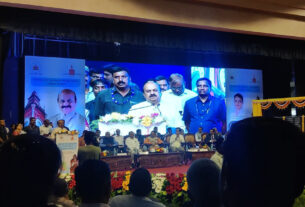UGC-recommended women study centers are few in number in Karnataka universities and the state is still lagging behind in its performance in gender equality.
Most universities in Karnataka do not have women study centers despite University Grants Commission (UGC) recommending that universities to build them to help achieve United Nations Sustainable Goal (SDG) 5 for gender equality.
Karnataka moved from the ‘aspirant’ stage to the ‘performer’ for its performance in SDG 5 in 2021 while being the front-runner in most of the SDGs.
Eight universities in Karnataka have women study centers. Karnataka was behind in two SDGs in 2018 that included SDG 5. In 2021, its score index for this goal was 57 which made it move to a higher stage of ‘performer’. However, Karnataka is a front-runner for most goals and is still behind in SDG 5.
The women study centers offer academic courses like Master of Philosophy (M.Phil) and Doctor of Philosophy (PhD) programmes in women studies, said Dr. Sudeshna Mukherjee, Associate Professor at the Center for Women Studies, Bangalore University (BU). Academic fields like sociology, economics and others are never looked at from a gender angle, and these courses have helped education reach a point where gender can no longer be ignored, she said.
Research conducted by these centers on women centric issues have helped in sensitizing the society about gender disparities and they can have impacted the government policies as well, she further said. With a regular enrollment of 30 students at BU, boys have taken up the course in majority, she further said. The aim of such studies is realized when later women studies’ students go for managerial roles in the government sector thus bringing diversity in the workplace, Mukherjee added.
Permanent faculty for courses under women study centers is an issue, said Dr. Shobha R, Associate Professor at a government college in Bangalore. “We do not have a women study center as of now. Though we are interested in setting up one. Students are not aware about these courses so firstly there is a need to talk about these programmes,” she added.
According to the UGC guidelines, the aim of women study centers is to include women’s contribution to society and social process and help them gain a perspective of their own lives, the broader social reality and their struggles and aspirations. The research work done in these centers is to encourage fetching data and conducting studies to develop indicators relevant to Indian context on empowerment and leadership.
However, such courses cannot help students get a job, said Dr. R Rajesh, Associate Professor of sociology at a university in Bangalore. They are required to make society aware about women issues and thus leading to their empowerment but sensitization can be done by everybody, he added. These courses were required earlier for realizing women issues but need not be multiplied as less students are willing to enroll because of lack of jobs, Rajesh said.
Impact
“I am sure these courses are vital in at least making people more aware of women’s issues as the research undertaken by students in the women studies course has a significant impact on women empowerment outside the institutions,” said Semanti Chakladar, a women studies’ student.
“The institution’s involvement in the special cells for women in police stations and the research has helped as a base in domestic violence cases. Hence such courses in educational institutions not just initiate dialogue but also help to come out with theoretical understandings that then affect women’s position in the society,” she further said.
Such research can help students look for data beyond the available data on the government websites, said Meenu Padha, president, National Child and Women Development Council (NCWDC), Jammu and Kashmir (J & K).
Data related to criminal activities and policy implementations are not fully revealed by the states and hence research conducted by students under this center can help in understanding the real scenario about laws and their implementation, she further said. “Students learn filing Right to Information (RTI) petitions and being students, they are considerate about their work which can help in getting potential results capable of impacting the framework of government policies for women,” she added.
However, the scope and impact of such study centers is not certain as the women scholars are expected to produce high quality research and bring in social activism. These expectations are not easy to fulfill in an environment bogged down with bureaucratic red tape and non-availability of funds. However, the women empowerment movement strengthened due to these projects and has been successful in achieving a degree of acceptance in academia. .




